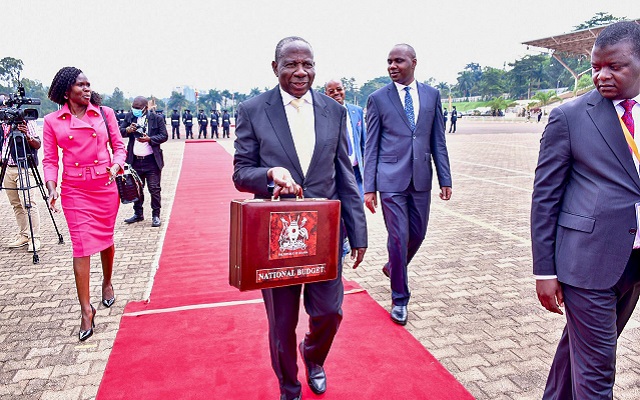
Experts want result-oriented interventions on debt, corruption, spending, and credit access for the private sector
Kampala, Uganda | JULIUS BUSINGE | The Ugandan government has been asked to be frugal in fighting corruption, exorbitant expenditure, and debt management if it is to achieve meaningful results in the implementation of the 2023/24 national budget.
The government plans to spend Shs52.7 trillion next financial year, a 10% jump from the Shs48 trillion in the current fiscal year that ends on June.30.
Fred Muhumuza, a senior economist and lecturer at Makerere University said people-centered projects like the Parish Development Model which has been allocated Shs1.1tn for the next financial year, and others targeting vulnerable groups like youth, women, and traders must be supported.
“The government has presented a very good budget, but the question remains on whether it can be implemented to deliver actual returns to the people,” he said at a post-budget dialogue organized by the Institute of Certified Public Accountants of Uganda on June 16.
Muhumuza said while the government projects the economy to grow at 6% next financial year and at an average of 6.5-7% per year over the next five years, it must be ready to deal with the likely adverse spillovers from high global commodity prices and production and trade tensions between the West/US and East/China led camps; tight global and domestic financial conditions characterized by high-interest rates; adverse weather conditions and relatively high and persistent inflation that could affect consumer and business demand and negatively affected business and consumer confidence.
He also said, budget-led interventions must counter the likely negative impact of the instability in the East African Community region where some of Uganda’s major export destination countries are located – Kenya, Democratic Republic of Congo, South Sudan and Rwanda.
Jane Nalunga, the executive director at SEATINI said the proposed budget is good but the increasing debt level is a major concern.
“We know you cannot avoid borrowing, but we also think it should be done in a moderate way so as not to compromise other priorities,” she said at a post-budget dialogue on debt and tax, organized by her organization and other partners on June 21 in Kampala.
The country’s public debt is projected to hit Shs88.9 trillion, equivalent to $ 23.7 billion, as of the end of June.30, up from Shs 80.8 trillion, equivalent to $ 21.7 trillion as of the end of December 2022.
Beyond Uganda, Nalunga said as the EAC partner states continue to increase their budgets as is the case for Financial Year 2023/24, they should devise means of ensuring that the revenue collected is commensurate with the increasing expenditure needs of the partner states.
She also said, revenue authorities must implement measures to up revenue collections and attain the desired tax-to-GDP ratio of 25% for EAC.
Nalunga noted that as public debt across EAC partner states crosses towards a level that is unsustainable, the situation is made worse by countries that have had to increasingly rely on indirect taxes such as VAT which is rather regressive, to meet the debt obligations. She said, fiscal spending should prioritise key sectors like health and education, agriculture, and social protection.
High cost of borrowing
In a presentation, Stephen Asiimwe, the executive director at Private Sector Foundation Uganda welcomed the new budget but said it did not make significant interventions on lowering the cost of credit for borrowers.
As a solution, he said, there is an urgent need to expand long-term sources of capital by converting the public sector pension scheme into a contributory scheme.
“Besides removing pension payments (Ushs800bn) of the budget, the saved money can be put into financial markets to add to the pool of local long-term funds… this is crucial in lowering the cost of capital,” Asiimwe said at a post-budget dialogue organized by PSFU on June 21.
He applauded the government for establishing the export guarantee fund to address one of the impediments to export growth which is access to capital for exporters.
However, Asiimwe said, his group requests for prioritisation of export-oriented infrastructure to boost exports.
Regarding the expansion of domestic demand, Asiimwe said programs like PDM, Emyoga were spot-on but he quickly added: “The PDM is particularly exciting for its ambition of bringing the 39% into the money economy so that they start buying goods and services. It is not yet Uhuru but it is the right direction. More involvement of the private sector is encouraged to ensure access to markets.”
Finance Minister, Matia Kasaija’s budget allocated Shs9.6trillion to human capital development for the next financial year, up from Shs 9 trillion this financial year as Peace, security, governance, and rule of law has been allocated Shs 9.1trillion, up from Shs 8.1trilion during the same period under review.
The integrated transport sector was allocated Shs 4.5 trillion, up from Shs 4.3 trillion. Private sector intervention got an allocation of Shs 2.4 trillion, Energy Shs 1.3 trillion, EACOP and the National Oil Company Shs 447bilion, and Minerals Development Shs 54.3 billion. Payment of domestic arrears was allocated Shs 200bn as digital transformation got allocated Shs 192 billion up from Shs 124bn in the current financial year.
Kasaija said the government plans to spend local revenue of Shs 29.7trillion equivalent to 14% of GDP, domestic borrowing amounting to Shs 3.2 trillion and budget support accounting for Shs 2.8 trillion.
Other funding sources include external financing for projects amounting to Shs8.3 trillion and domestic debt refinancing amounting to Shs 8.4 trillion among others.
However, the government will spend approximately Shs17 trillion in the settlement of debts including interest payments worth Shs 6.1 trillion and domestic debt financing amounting to Shs 8.4 trillion.
 The Independent Uganda: You get the Truth we Pay the Price
The Independent Uganda: You get the Truth we Pay the Price


